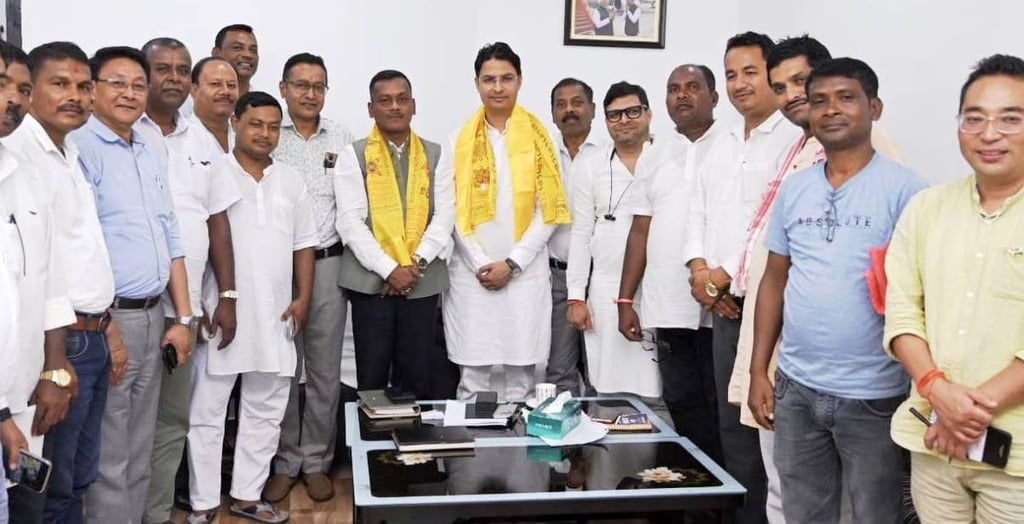MP Raju Bista meets tea trade union leaders, vows to fight for workers’ rights
North Bengal’s economy is closely tied to the tea industry, which employs lakhs of people across Darjeeling, Terai and Dooars.
LOCAL


Darjeeling MP and BJP National Spokesperson Raju Bista on Sunday held a detailed meeting with leaders and representatives of tea trade unions from the Darjeeling hills, Terai, Dooars and other parts of North Bengal to discuss the long-standing issues faced by tea garden and cinchona plantation workers. The meeting, which brought together senior BJP leaders focused on the urgent concerns of low wages, non-implementation of labour laws and the alleged neglect of workers’ rights by the West Bengal government.
According to Bista, tea garden and cinchona plantation workers remain some of the most exploited sections of the workforce despite their contribution to the state’s economy. “We discussed in detail the challenges faced by workers, including their extremely low wages, the non-implementation of the new Labour Codes passed by Parliament, and the continued exploitation of workers whose rights are being denied by the West Bengal government,” Bista said.
The gathering was attended by several key leaders, including Alipurduars MP Manoj Tigga, Matigara-Naxalbari MLA Anandamay Barman, Phansidewa MLA Durga Murmu, BJP State Trade Union Relation Cell Co-convenor Aritra Chatterjee, and Darjeeling District BJP President Sanjeev Lama, among others. Their presence highlighted the seriousness with which the party is approaching the long-standing grievances of the tea sector workforce.
The tea industry in North Bengal, particularly in Darjeeling, Terai and Dooars, is one of the largest employers in the region. Yet, despite decades of service, workers continue to face issues of meagre wages, lack of social security, and poor implementation of government schemes. Plantation workers have often complained that while tea remains one of the state’s most profitable exports, their own lives have not improved. Basic needs such as housing, education, and healthcare remain inadequately met.
Bista said that the BJP will stand shoulder to shoulder with the workers in their fight for justice. “We are committed to working collectively with all trade and workers’ unions to safeguard the rights of workers, address their grievances, and ensure justice for every tea and cinchona garden worker,” he said.
A major point of discussion in the meeting was the non-implementation of the new Labour Codes passed by the Indian Parliament. These laws, once effectively enforced, are expected to benefit workers by ensuring fair wages, social security, and better working conditions. However, union leaders alleged that the state government has failed to implement these laws in West Bengal, leaving workers vulnerable to exploitation.
Union members also expressed concern over the lack of accountability from estate owners and the state administration in addressing the demands of plantation workers. Many gardens in Dooars and Terai continue to report irregular payment of wages, delays in provident fund contributions and poor housing conditions, issues that have persisted for years.
Bista reiterated that the BJP remains deeply committed to the welfare of tea workers. He said that the party will continue to raise the matter both in Parliament and at the state level to ensure that workers are not denied what is rightfully theirs.
North Bengal’s economy is closely tied to the tea industry, which employs lakhs of people across Darjeeling, Terai and Dooars. The unique flavour of Darjeeling tea is recognized globally, yet the people who produce it often live in difficult circumstances. Cinchona plantation workers, who contribute to the production of quinine used in medicines face similar struggles.
Raju Bista, who has been vocal on workers’ issues in Parliament, made it clear that the BJP sees the matter not just as a political question but as a moral responsibility. “This is about justice. These workers are the backbone of the tea industry and they deserve dignity, respect, and fair treatment,” he said.
